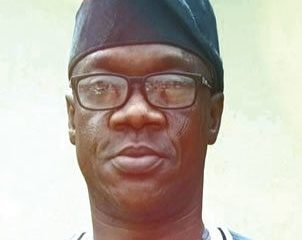News
OPINION: Kumuyi, Tortoise And Looters Of Noodles
Published
2 months agoon
By
Editor
By Lasisi Olagunju
Wise old Tortoise sat his children down. “My dear ones, two things are essential for your growth and wellbeing in life: Always tell the truth, and never ever take whatever is not yours.” The attentive children nodded; they promised to do as their father counseled. They bowed before their dad and left. Four years down the road, there was a severe famine in the land. Food was as scarce as masquerade’s shit. Husbands bartered their wives for grains; wives traded their husbands for a basket of yam. It was as bad as Ireland’s Great Hunger of 1845 which killed one million out of a population of eight million people.
Upright Tortoise’s household was hit by this mother-of-all-famines. There were casualties in his neighborhood. His own children may soon join the fallen. Tortoise panicked. What was he going to do? He talked to himself. He went out one day and came back home with a solution to hunger in his home. On his head was a big basket containing a variety of food items. Tortoise told his children that he found the foodstuffs abandoned in the forest. “It must have been God at work,” he told his children. His disappointed children exchanged looks. They knew that their father had just lied. He stole the items and they told him so: “Father, but you told us never to take what is not ours, and never to lie.” Embarrassed, Tortoise could only mutter some incoherent words. Then he found his voice: “I did it for you, my children. These are terrible times.”
This last Friday at a place called Dogarawa near Zaria, a truck driver transporting cartons of noodles thought it was time to say his Jumat prayers. He parked his BUA truck and joined the congregation. Like predatory soldier ants swarming a bunch of palm nuts, an army of looters invaded the truck and stripped it of every item it was carrying. “Not a single carton of the noodles the truck was carrying was left by the hoodlums,” an eyewitness told a reporter. The driver was helpless. The people he shared the prayer ground with largely made up the looting party. The invaders left the mosque for the truck. They were contemptuous of the law and disdainful of morality. They had no fear of God to whom they prayed. They chose food over faith. “Ba imani (they have no faith),” a disappointed man who video-recorded the event lamented. Ten of the looters were arrested. I will be shocked if the looters agree that they committed any offence.
FROM THE AUTHOR: OPINION: Our President’s Love Affair With The IMF
“Hunger makes a thief of any man” is a popular quote among famine and poverty scholars. It is originally from Pearl Buck’s 1931 Pulitzer Prize-winning novel, The Good Earth. The book is the first volume of her House of Earth trilogy which largely contributed to her winning the Nobel Prize for Literature in 1938. The novel’s protagonist, poverty-stricken Wang Lung, nurses a starving family. One day, one of his sons brings home stolen meat. Wang Lung sees the stolen item and vows that his sons must not grow up to become thieves. In anger, he throws away the stolen meat. But his wife disagrees – there is a family to feed. She gets up, calmly picks up the meat and cooks it. Wang Lung may deplore that act of thievery and his wife’s disgraceful act of receiving a stolen property, but the hungry must eat. The food is ready; the family eats the forbidden and washes it down with cold water. Fast-forward to years of unremitting poverty and hunger. The same upright Wang Lung later in the story joins a food riot, invades a rich man’s house, takes all the rich man’s money and builds his wealth from the heist.
I am scared because rain does not fall on one roof. In 2024 Lagos, a stampede for rice killed many. Yesterday (Sunday), there were reports of yet another invasion of a government warehouse in Gwagwa, Abuja, by looters of stored food items. Some of the looters probably left Sunday’s church service to partake in the looting. A week before the Zaria truck looting incident, some trailers loaded with foodstuffs in the Suleja area of Niger State suffered the same fate. Bags of rice and other food items in the vehicles were looted by wanton boys and girls. The loot-takers probably thought they were poor because the truck owners were rich. Such a line of thought is dangerous. It is equally dangerous to assume that the hungry are responsible for their own hunger and should, therefore, fix themselves.
Jibia is a border town in Nigeria’s North-West. One Sade Rabiu, a leader of that community, told Qatar-based Aljazeera last week that his people were dying of hunger. “Poverty can lead to theft and murder…anything for survival,” the community leader was quoted as saying. What he said was very unpleasant but may be brutally true. Colonial archives are replete with records of hunger-induced crimes in every corner of Nigeria. Kostadis Papaioannou in 2014 did extensive work on this issue covering the years between 1912 and 1945. He quotes documents and persons; he cites books. He uses “historical newspapers and government reports to explore food shortages, crop-price spikes and outbreaks of violence.” The picture you get after reading his 43-page report tells you that what we saw in Zaria on Friday and in Abuja yesterday were simply a reenactment of the blights of the last century. Nothing new is happening under our heavens. The poor have refused to change in their larcenous reaction to hunger; the society has remained inattentive to implications of mass poverty. In 100 years, we’ve moved without progressing.
FROM THE AUTHOR: OPINION: Abuja And The Two Nigerias
There was a very bad famine in Nigeria in 1913 which saw people doing the unthinkable to survive. There are always social consequences for food inadequacies. Colonial official A. C. G. Hastings (1925: 111) recalls that “…the ghost of famine stalked aboard through Kano and every other part. The stricken people…ravenous in their hunger, seized on anything they could steal or plunder.” In a particular province, “the local inhabitants, in need for food, plundered and stole everything in their way.” That was in 1913. Similar experiences dotted the years of lean or no harvest throughout our colonial period. Judicial statistics, police and army documents on that period, according to Papaioannou, showed increased crimes in Ogoja (present Cross River), Ondo and Enugu – all due to increased food prices, decreased income, and generally heightened economic pressures.
People react differently to hunger. Dirty, hungry Tortoise tells the soap hawker at his backyard: “When I have not washed my inside, how can I wash my outside?” Last December, the General Superintendent of the Deeper Life Bible Church, Pastor William Folorunso Kumuyi, asked members of his church to redirect their offerings from the church to the poor and the needy in their communities. He said: “All the offerings are not just for the church. There are poor people around. There are unemployed people around. There are indigent people around. We must build our campground – I understand; we are going to build it. But, while you are building (the church), your neighbours are dying. Those who do not have anything to feed are there. Your brothers, your sisters have nothing to send their children to school. Which one comes first when your house is leaking and your mother is dying? How will you spend it (your money) —mending the leaking room or taking care of your mother?” He said his church would go back to “the good old days” when religion served God by taking care of the poor. And, truly, unlike now, the poor used to have a space in the heart of priests and prophets.
Pastor Kumuyi’s sermon was a breath of fresh air. In that short message, he radically redefined religion’s engagement with the people. The former should subsidise the latter; it should not be the other way round. I am not a member of Kumuyi’s church and, so, I do not know how far he has gone in making real what he said on the pulpit. But he did well and should not be alone. Others, particularly the Imams of northern Nigeria, should extend their mandates beyond leading prayers and mobilising the poor for politics. A Jumat service and a looting spree happened at the same place, same time in Zaria last Friday. How else do we define failure of religion? People are stealing to survive. Pastors are losing their flock to satanic fodders; Imams are losing their followers to grains of haram.
FROM THE AUTHOR: OPINION: For Nigerian Soldiers And Judges
The rich cannot continue to ignore the poor – particularly when the poor are poor due to no fault of theirs. We (the elite) are an unfeeling lot. We relate with hunger only as mere media content. We take it as mere texts read in newspapers and as staid social media posts. We think today’s suffering is unreal, contrived. How do you tell the hungry that his hunger is not hunger; that it is exaggerated, or that his loud protests are sponsored? It is time we dispensed with our disgust for the dirt of the poor. Time is running out. We should stop gawking at the grotesque of want. Can we “stop a moment” and “see the poor” as Rebecca Harding Davis asks the rich to do in her ‘Life in the Iron-Mills’? Can we, like Davis, stop taking heed of our “clean clothes” and plunge “into the thickest of the fog and mud and foul effluvia” and save our skins by stopping the hunger in the land? The clock is ticking. Any age that packs what Jacob Riss (1890) calls “ignorant poverty” and “ignorant wealth” into its social space incubates a big bang. New York’s Fifth Avenue is a metaphor for world-class luxury. ‘The Man with the Knife’, Riss warns, stands at the corner of the “Fifth Avenue”. Helping him to drop the knife is helping ourselves.
Nigeria can’t be tired of helping the poor. Forget about the government and its voodoo economics on subsidy. The social consequences of mass hunger are never pleasant. The developed world today has various social safety nets for vulnerable families and individuals in poverty. The society that does this is neither stupid nor is it a spendthrift. It has simply come to accept that people can be poor without being hungry. My people say when hunger is removed from poverty, poverty is dead. Looting of stores and trucks are bad omens. These acts nudge us to wake up and act responsibly. We may not eradicate poverty but every good society, from the earliest times, knows that the way to peace and security is in taking starvation out of people’s poverty.
There was a time Western Europe burnt its fingers trying to de-subsidise the needy and legislate the poor out of existence. It failed. I use England here as an example. In 1834, England introduced what it called the New Poor Law to regulate paupers and their unenviable lives. The rich and powerful welcomed the law; they applauded its provisions which reduced the cost of looking after the poor. The new law created what was called ‘workhouses’ to house and hide the poor. The privileged were happy that the workhouse provision would “take beggars off the streets and encourage poor people to work hard to support themselves.” Critics called the workhouses “prisons for the poor.” Of course, the workhouse concept failed; it suffered riots and the structures were victims of attempted arsons. You are very conversant with Charles Dickens’ Oliver Twist. The story draws its plot from this experience of structures without humanity; its message mimics mansions of well-fed masters and hungry, scrawny inmates. If the Poor Law had worked and the workhouse had been a success, Oliver Twist would not have asked for more.
Between 21 and 25 October, 2009, I was in Las Vegas, United States for that year’s Conference of American Black Mayors. One of the leaders who spoke at that event was the then vice president of Malawi, Mrs Joyce Banda. Banda, who spoke on the African woman and resilience in the face of hardship, said “African women don’t cry. They don’t feel pain. Touching fire is nothing.” The African woman was always a hero in very bad times. She would feed her family even from nothing. Banda likened her to Hare who was seen cooking something in a season of hunger. The story teller said all the other starving, helpless animals saw smoke coming out of Hare’s hearth and rushed to her kitchen. “I am not cooking food. I am boiling stones,” she told her guests. Disappointed, the guests hissed, and Hare told them softly not to rebuke her: “At least I am doing something about the situation.” Our government has repeatedly told the hungry to be patient (E lo f’okàn balè). I hope what is cooking in Abuja’s pot is not what Hare was boiling – stones.
You may like


Bello And Enenche: A Tale Of Two Lions [OPINION]


OPINION: Why Were Miyetti Allah And Tinubu’s Iyaloja In Ibadan?


OPINION: Bobrisky’s Masque, Yahaya Bello’s Boa


OPINION: Onitiri-Abiola And The Madness In Ibadan


OPINION: For Yoruba Muslims And Pentecostals


OPINION: Bobrisky And Our Other S/He Offsprings
News
Tribunal Restrains MultiChoice From hiking DStv, Gotv Subscription Rates
Published
35 mins agoon
April 29, 2024By
Editor
A Competition and Consumer Protection Tribunal sitting in Abuja, on Monday, issued a restraining order on Multi-Choice Nigeria Limited from increasing its tariffs and cost of products and services.
Multi-choice had last week announced a price increment across its DStv and GOtv packages effective May 1, 2024.
The pay-TV company claimed the price hike was due to the cost of business operations in Nigeria.
A three-member tribunal, presided over by Saratu Shafii, gave an interim order following an ex-parte motion moved by Ejiro Awaritoma, counsel for the applicant, Festus Onifade.
READ ALSO: Multichoice Hikes DStv, GOtv Prices
The tribunal, in a ruling, restrained Multi-Choice from going ahead with the impending price increase schedule to take effect from May 1, pending the hearing and determination of the motion on notice filed before it.
“The 1st defendant is hereby restrained from taking any step(s) that may negatively affect the rights of the claimant and other consumers in respect of the suit pending the hearing and determination of the motion on notice,” Shafii declared.
She, therefore, directed all parties in the suit to appear before the tribunal on May 7 at 10 am for the hearing and determination of the motion on notice.
The lawyer in the suit marked: CCPT/OP/2/2024, had dragged Multi-Choice Nigeria Ltd and the Federal Competition and Consumer Protection Commission (FCCPC) before the tribunal.
READ ALSO: US Man Bags Multiple Deaths Sentence After Paying Mother $2,500 To Rape 5-year-old Daugher[PHOTOS]
In the suit filed on April 29, Onifade, also a legal practitioner, sought two orders.
These include, “an order of interim injunction of this honourable tribunal restraining the 1st defendant whether by themselves, her privies, assigns by whatsoever name called from going ahead with impending price increase schedule to take effect from 1st May 2024, pending the hearing and determination of the motion on notice.
“An order restraining the 1st defendant from taking any step(s) that may negatively affect the rights of the claimant and other consumers in respect of the suit pending the hearing and determination of the Motion on Notice.”
Other members of the tribunal include Thomas Okosun and Dr. Umar Duhu.

By Lasisi Olagunju
The Greek word ‘philos’ means ‘love’, and ‘anthropos’ means ‘man’ or ‘humanity.’ The Englishman came across those two words, combined them and came up with ‘philanthropy’ – ‘love of mankind.’ The Ancient Greek was a nation of great thinkers. World civilizations inherited from these great people rare knowledge preserved in myths, folktales and legends of heroes. They clothed their myths with assumptions and beliefs that have endured centuries of interrogations and reviews. One of those is their insistence that one of their titans, Prometheus, was the very first philanthropist.
And I ask how? ‘Prometheus’ as a Greek name means ‘Forethinker’. One writer says we should not be tired of celebrating him because “he loved us. He helped us. He defied the other gods and suffered for us.” To Timothy Wutrich, American Professor of Comparative Arts, Prometheus is “the polymath, creative genius, and philanthropist” who rebelled against Zeus to save humanity. What exactly is that thing he did?
The Greek in their myth say man was created naked and vulnerable in a hostile world of privileged beasts. But Prometheus, who was present during creation, took a deep look at the helpless creature, thought of what to do, fished out fire from where Zeus hid it and gifted it to Man. Classical Greek dramatist, Aeschylus (524-455 BC), in his ‘Prometheus Bound’ casts him as humanity’s “preserver” who gave us “all the arts and sciences as well as the means of survival.”
The immediate past president and chief executive officer of The Pew Charitable Trusts, Rebecca W. Rimel, on 28 April, 2001, addressed a joint meeting of the American Philosophical Society, the Royal Society and the British Academy on what she called the strategy of charity. At that proceeding, she addressed the Promethean fire philosophy. She explained ‘fire’ as that long-term solution that addressed the root of a problem: “The gift of fire,” Rimel explained, “transformed the world. Fire did not simply permit a few people to enjoy a hot meal and a warm shelter on the day it was given. It was a new tool that could be used forever to help humans make their often-hostile environment more accommodating…” She suggested that ‘fire’ could stand for education, for knowledge, skill. It could wear the dress of the master going the extra mile of teaching his protégés how to fish. She added that “philanthropy is not simply a kind attitude – it also implies a certain kind of approach” which we see in the myth of Prometheus. She proceeded to sit Prometheus with Thomas Jefferson and the American founding father’s profound belief that “a free nation could remain free only if its people were educated.” She alluded to Jefferson’s 1808 “ardent desire to see knowledge” in every man.
When Globacom chairman, Dr. Mike Adenuga Jr., turned 70 last year. I wrote a column and gave reasons why I did: his patriotism; his calls of commendation to me – and his kindness across all divides. Recently when Air Peace appeared buffeted by vicious tides of competition, I wrote and likened that company’s intervention to Globacom’s epochal entry into telecoms in Nigeria. I said before Globacom, there was exploitation from outsiders and Nigerians were made victims in their own country. The Nigerian telecoms subscriber was the pre-Prometheus man – naked and helpless. Then, Mike Adenuga’s company made its grand entry in August 2003 and its Promethean fire broke the chains. It was amazing how miserably the padlocks of brutal exploitation surrendered. My triumphant people would say they’d seized the enemy’s àgádágodo – the ones clothed with tiger skin and the ones hidden in hides of alligator (aláwo ekùn, àt’aláwo agílíntí).
Adenuga and his Globacom came with a string of firsts that have been mentioned repeatedly. Someone asked why those acts of patriotism are repeatedly told as stories, I answered that Nigerians of today who are thirty years and younger were too young in August 2003 to appreciate the battle won for them by Adenuga 21 years ago. They need to be told repeatedly that it happened. Read again Thomas Jefferson’s dictum which I quoted above: A free nation can only remain free if its people are educated. I add that education includes adequate knowledge of our history.
Today again, Adenuga celebrates his 71st birthday. I read many testimonies of his unannounced public-spiritedness last year when he clocked 70. I am reading (and savouring) refreshingly new ones this year. The stories of his activities are so much like the Promethean story: philanthropy that clothes the naked and addresses the roots of people’s poverty; charity that ennobles humanity and extends the frontiers of knowledge, friendship, love and kindness. The book of his benevolence includes chapters on scholarships and endowments in arts and science. Ask universities around; ask the Alliance Francais in Lagos. Ask the rescued widow in the backwaters of Yewa whose story changed forever. Ask me: I know (and I have heard) of people he dazed with kindness whom he did not give the opportunity to say “thank you.” As he does his Godly thing his quiet way, we will keep telling the world in our own loud words that he represents the best of humanity.
I wish him a happy birthday and very many more years of sweetness as his vintage wine grows in richness.
News
2024 UTME: JAMB Withholds Results Of 64,624 Candidates
Published
3 hours agoon
April 29, 2024By
Editor
The Joint Admissions and Matriculation Board, on Monday, announced the release of the 2024 Unified Tertiary Matriculation Examination.
The Registrar of the Board, Prof. Ishaq Oloyede, made this known during an ongoing press briefing in Bwari, Abuja.
Oloyede also noted that the results of 64,624 out of the 1,904,189 who sat the examination have been withheld by the Board and will be subject to investigation.
READ ALSO: JUST IN: WASSCE Begins April 30
The Board Registrar noted that though a total of 1,989,668 registered, a total of 80,810 candidates were absent.
“For the 2024 UTME, 1,989,668 candidates registered including those who registered at foreign centres. The Direct Entry registration is still ongoing.
“Out of a total of 1,989,668 registered candidates, 80,810 were absent. A total of 1,904,189 sat the UTME within the six days of the examination.
READ ALSO: BREAKING: JAMB Releases 2024 UTME Results
“The Board is today releasing the results of 1,842,464 candidates. 64,624 results are under investigation for verification, procedural investigation of candidates, centre-based investigation and alleged examination misconduct.”
Oloyede also said the Board, at the moment, examines nine foreign centres namely: Abidjan, Ivory Coast; Addis Ababa, Ethiopia; Buea, Cameroon; Cotonou, Republic of Benin; London, United Kingdom; Jeddah, Saudi Arabia; and Johannesburg, South Africa.
“The essence of this foreign component of the examination is to market our institutions to the outside world as well as ensure that our universities reflect the universality of academic traditions, among others. The Board is, currently, fine-tuning arrangements for the conduct of the 2024 UTME in these foreign centres.”
Details later…

Tribunal Restrains MultiChoice From hiking DStv, Gotv Subscription Rates

Edo Guber: PDP BoT Member, Idahosa Resigns From Party

OPINION: Between Mike Adenuga And Prometheus
Trending

 News4 days ago
News4 days agoEdo: FRSC Threatens Sanction On Truck Drivers Loading Goods, Passengers Together

 Headline4 days ago
Headline4 days agoSaudi Arabia Opens First Alcohol Store, Nigerian Muslims React

 Headline4 days ago
Headline4 days agoVIDEO: Meet Nigerian Pastor Who Predicted World Will End April 25

 News4 days ago
News4 days ago243 Passengers Cheat Death As Air Peace Plane Makes Emergency Landing At Lagos Airport

 Metro4 days ago
Metro4 days agoJUST IN: Four-year-old Boy Dies In Abuja School, Parents Suspect Foul Play

 Metro4 days ago
Metro4 days agoJUST IN: Protesters Storm APC Secretariat, Demand Ganduje’s Resignation

 Politics4 days ago
Politics4 days agoEdo Guber: PDP Unveils 200-member Campaign Council

 News3 days ago
News3 days agoDSTV Price Hike: Five Alternatives Nigerians Are Opting For

 News4 days ago
News4 days agoEFCC Withdraws Appeal Against Former Kogi Gov, Bello

 News4 days ago
News4 days agoJUST IN: Senator Ayogu Eze Is Dead




























